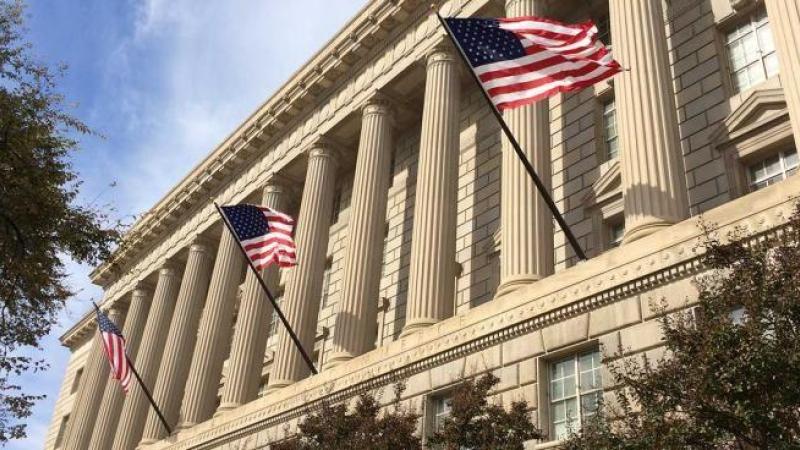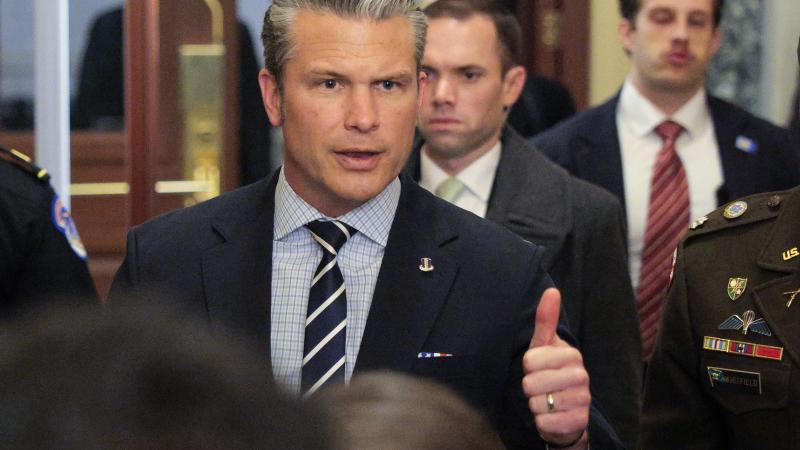Biden infrastructure law gave billions to upgrade ports, now striking unions want to stop automation
The discrepancy between the priorities of Biden’s infrastructure spending and his support for the labor union leading the strikes raises concerns about the benefits of pouring money into infrastructure while real upgrades are being blocked by union allies.
Shortly before President Joe Biden signed the bipartisan infrastructure bill, his White House showcased $17 billion in funding set aside for upgrades in U.S. port infrastructure for strengthening supply chains and boosting competitiveness. Now, he is now refusing to deal with a union standing in the way of efficiency-boosting automation technology where the U.S. lags behind.
The discrepancy between the priorities of the widely touted Infrastructure Investments and Jobs Act and President Biden and Vice President Kamala Harris’ support for the labor union leading the strikes raises concerns about the benefits of pouring money into infrastructure while real upgrades are being blocked by union allies.
The President of the National Taxpayers Union, Pete Sepp, told Just the News the government should claw back infrastructure funds because the union blocking real ways of boosting competitiveness.
“[The infrastructure law] included $17 billion worth of new federal money to upgrade and introduce new technologies into ports. Well, now the longshoremen's union is saying, as part of the condition of going back to work, we don't want any more automation at ports. In fact, they may be calling to reverse some of the automation that's been going on,” Sepp told the "Just the News, No Noise" TV show Wednesday.
“Okay, fine. If they get that demand granted, then taxpayers have a demand too,” he said. “We want that $17 billion back, or at least the balance that hasn't been spent yet.”
Infrastructure bill caters to union demands
From the beginning, a provision buried deep in Biden’s signature infrastructure law catered directly to the union and its port workers and ensuring that the billions earmarked for competitiveness upgrades could not be used for any future port automation—a clear handout to the union constituency that supported Biden in 2020 and Democratic nominee Kamala Harris is struggling to retain this year.
Some of the $17 billion was specifically earmarked for upgrades to America’s aging port equipment, specifically targeting zero-emission updates. However, other laws passed during the Biden administration defines such upgrades in a way that excludes automated technologies and caters to the union.
"The term 'zero-emission port equipment or technology' means human-operated equipment or human-maintained technology,” the current U.S. code reads.
At the time, the ILA announced its support for the infrastructure bill but promised that it would continue to fight any automation at U.S. ports.
“President Biden knows that the ILA supports his efforts to ‘Build Back Better’ but have made it clear that no federal money should be used to support automating our nation’s ports at the expense of ILA jobs,” Daggett said in a statement about Biden’s plans.
“We look forward to working with the Biden Administration to protect all longshore jobs from automation and we applaud his support for the rights of workers to organize,” he added.
Shortly before Biden signed the bill into law, he touted how it would provide funding for significant upgrades to American ports in a speech in Baltimore.
“You know, this is going to—it's going to modernize our ports with $17 billion in investment—$17 billion in investment,” Biden said.
“We're going to reduce congestion. We're going to address repair and maintenance backlogs, deploy state-of-the-art technologies, and make our ports cleaner and more efficient,” he promised.
The blocking of automation in union contracts and preventing federal funding for those technologies may render Biden’s promise of addressing port efficiency and making them “state-of-the-art.”
U.S. ports already lag behind
According to the World Bank’s Container Port Performance Index for 2023, the United States does not have any one of its ports in the top 50 world rankings despite having the richest economy by most common metrics. The highest ranking U.S. port, Charleston, comes in at 53 and is outranked by a plethora of facilities across Asia, Africa, South America and Europe.
One study by the Pacific Maritime Association found automated terminals in Los Angeles and Long Beach had a container throughput per acre 44% higher than those terminals without automation. Additionally, and contrary to ILA claims, the study also found those terminals added additional port workers to keep up with the efficiency boosts at a rate 3% higher than other ports on the West Coast.
“If automation had lots of negative effects, the data would show it,” said Dr. Michael Nacht, a professor of public policy at Berkeley and report contributor. “We’ve lived through over 100 years now of successful automation in all kinds of industries.”
However, a union-funded study disputed some of these claims, saying that automation eliminated more than 500 jobs from those ports.
Biden and Harris signal support for union demands
On Thursday, the U.S. entered the third day of a general strike across a majority of East and Gulf Coast ports led by the International Longshoremen’s Association union which is demanding a more than 70% pay increase for its workers and language that would shield union jobs from full or semi-automation.
If the union doesn’t get what it wants, says ILA boss Harold Daggett, its strike will “cripple” the economy just over a month out from election day and as recovery efforts are just beginning in a hurricane ravaged Southeast.
"I will cripple you"
The strike threatens to plug up an estimated $2.1 billion in daily trade flows from these busy ports as the presidential election and holiday seasons fast approach. Despite calls by Republicans and industry groups for Biden to invoke the Taft-Hartley Act to end the strike, the president and his White House confirmed he would not get involved even amid the threats from Daggett and his union.
“In today’s world, I’ll cripple you,” ILA President Harold Daggett said previously in a video post. “I will cripple you.”
The ILA has placed port automation at the center of its negotiations with the United States Maritime Alliance (USMX), a coalition of container carriers, employers and port associations across the East Coast strike locations.
“They have language in there now that’s not strong enough,” Daggett told CNN, criticizing language in the existing labor agreement outlining protections from automation. “Because what happens is they come in with new technology…and that means the trucks are coming in and they’re already checked in somewhere else and not using the checkers in the ILA.”
Daggett draws a red line at automation, promising to sink any proposed deal if it doesn’t include those protections. “It’s not fair,” Daggett reportedly said. “And if we don’t put our foot down now, they would like to run over us, and we’re not going to allow that.”
The Biden administration, in fact, has gone further than just staying out of the dispute. Biden and Harris released statements after the strike began signaling support for the key union demands, Just the News reported.
“This strike is about fairness,” Harris said in a statement. “The Longshoremen, who play a vital role transporting essential goods across America, deserve a fair share of these record profits.” Secretary of Commerce Gina Raimondo said on CNBC's "Squawk Box" Monday that she "hasn't been particularly involved" on the strike of port workers.
Some manufacturers and retailers are urging President Joe Biden to invoke the Taft-Hartley Act, a 1947 law as a way to suspend a strike by 45,000 dockworkers that has shut down 36 U.S. ports from Maine to Texas. Biden has said that he won't intervene in the strike.
The Facts Inside Our Reporter's Notebook
Links
- Infrastructure Investments and Jobs Act
- the union constituency that supported Biden in 2020
- Some of the $17 billion
- current U.S. code reads
- promised that it would continue to fight
- touted how it would provide funding
- World Bankâs Container Port Performance Index for 2023
- found automated terminals
- said Dr. Michael Nacht
- a union-funded study
- said previously in a video post
- an estimated $2.1 billion in daily trade flows
- Daggett told CNN
- Harris said in a statement
















